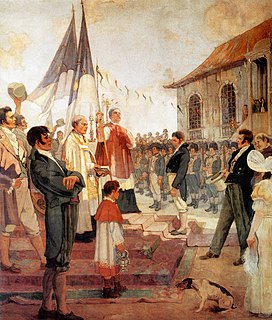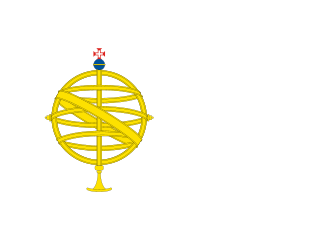
Recife is the fourth-largest urban agglomeration in Brazil with 4,031,485 inhabitants, the largest urban agglomeration of the North/Northeast Regions, and the capital and largest city of the state of Pernambuco in the northeast corner of South America. The population of the city proper was 1,625,583 in 2016. The first slave port in the Americas, Recife was founded in 1537, during the early Portuguese colonization of Brazil, as the main harbor of the Captaincy of Pernambuco, known for its large scale production of sugar cane. It was the former capital Mauritsstad of the 17th century colony of New Holland of Dutch Brazil, established by the Dutch West India Company. The city is located at the confluence of the Beberibe and Capibaribe rivers before they flow into the South Atlantic Ocean. It is a major port on the Atlantic. Its name is an allusion to the stone reefs that are present by the city's shores. The many rivers, small islands and over 50 bridges found in Recife city centre characterise its geography and led to the city being called the "Brazilian Venice". As of 2010, it is the capital city with the highest HDI in Northeast Brazil and second highest HDI in the entire North and Northeast Brazil.

Olinda, is a historic city in the Brazilian state of Pernambuco, located on the country's northeastern Atlantic Ocean coast, in Greater Recife. It has a population of 389,494 people, covers 41.681 square kilometres (16.093 sq mi), and has a population of 9 inhabitants per square kilometer. It is noted as one of the best-preserved colonial cities in Brazil.

Paubrasilia echinata is a species of flowering plant in the legume family, Fabaceae, and is endemic to the Atlantic Forest. It is a Brazilian timber tree commonly known as Pernambuco wood or Brazilwood and is the nation tree of Brazil. This plant has a dense, orange-red heartwood that takes a high shine, and it is the premier wood used for making bows for stringed instruments. The wood also yields a red dye called brazilin, which oxidizes to brazilein.
The Praieira revolt, also known as the Beach rebellion, was a movement in the Pernambuco region of Brazil that lasted from 1848 to 1849. The revolt, influenced by revolutions taking place in Europe, was due in part to unresolved conflicts left over from the period of the Regency and local resistance to the consolidation of the Brazilian Empire that had been proclaimed in 1822. The movement was led by radical elements of the Liberal Party of Pernambuco against the ruling Conservatives.

Clube Náutico Capibaribe, also known as Náutico, is a Brazilian sports club, including a professional football team, in Recife, Pernambuco. Náutico, as of 2018, is competing in the Serie C.
The Campeonato Pernambucano de Futebol is the football championship of Pernambuco state, Brazil, and is organized by the FPF.
The Federal Rural University of Pernambuco is a higher education institution in Brazil, specializing in courses in agricultural sciences and other courses that "compete or will compete for the development of rural areas." The university also conducts research in these areas. However, in recent years the university has added a wider variety of courses. It has three campuses, one in Recife (headquarters), one in Garanhuns and another in Serra Talhada, UFRPE still possesses advanced campuses throughout the state.

Jaboatão dos Guararapes is a city in the state of Pernambuco, Brazil. It is a part of the Recife metro area. The population was 687,688 according to the Brazilian Institute of Geography and Statistics (IBGE) in 2009, making it the second most-populous city in the state of Pernambuco and the 26th in Brazil, ahead of major Brazilian state capitals such as Cuiabá and Aracaju. The city is a very important industrial center, hosting companies like Unilever and Coca-Cola. It is bordered by Recife in the North, Cabo de Santo Agostinho on the south, and Mangue forests to the west in Moreno.

The University of Pernambuco is a public state university located in Recife, Pernambuco, Brazil.

Diário de Pernambuco is a newspaper published in Recife, Brazil. The newspaper began publication on 7 November 1825. It is the oldest continuously circulating daily in Latin America and the oldest continuously circulating newspaper edited in Portuguese.

Salgueiro Atlético Clube is a Brazilian football club, founded in 1972 in Salgueiro, Pernambuco.

Arena Pernambuco is a multi-use stadium in the western suburbs of the Recife metropolitan area, in São Lourenço da Mata, Brazil. It is used mostly for football matches and was used to host matches during the 2014 FIFA World Cup. The stadium has a capacity of 44,300 spectators. In 2012 Clube Náutico Capibaribe, one of three professional football clubs in the Recife metro area, signed into agreement to become part owners of the new stadium. Beginning in July 2013, Clube Náutico Capibaribe will play all of their home games at Itaipava Arena Pernambuco. The stadium was previously known as Itaipava Arena Pernambuco under a sponsorship arrangement with brewing company Grupo Petrópolis between 2013 and 2016.

The Pernambucan revolt of 1817 occurred in the province of Pernambuco in the Northeastern region of Brazil, and was sparked mainly by the decline of sugar production rates and the influence of the Freemasonry in the region. Other important reasons for the revolt include: the ongoing struggle for the independence of Spanish colonies all over in South America; the independence of the United States; the generally liberal ideas that came through all of Brazil the century before, including many French Philosophers, such as Charles Montesquieu and Jean-Jacques Rousseau; the actions of secret societies, which insisted on the liberation of the colony; the development of a distinct culture in Pernambuco.

The Captaincy of Pernambuco or New Lusitania was a hereditary land grant and administrative subdivision of northern Portuguese Brazil during the colonial period from the early sixteenth century until Brazilian independence. At the time of the Independence of Brazil, it became a province of United Kingdom of Portugal, Brazil and the Algarves. Captaincies were originally horizontal tracts of land 50 leagues wide extending from the Atlantic Ocean to the Torsedillas meridian.

The State of Brazil was one of the states of the Portuguese Empire, in the Americas during the period of Colonial Brazil.

Irandhir Gleriston Santos Pinto is a Brazilian actor.

The Pernambuco Federal Institute of Education, Science, and Technology (Portuguese: Instituto Federal de Educação, Ciência e Tecnologia de Pernambuco, IFPE) is a Brazilian institution of higher education located in Pernambuco State, Brazil. Its rectory is headquartered in Recife, Pernambuco. The IFPE is one of the oldest and most traditional among the Federal Institutes, it has 9 campuses and offers Technical, undergraduate and postgraduate courses, as well as researches and scientific production.

Humberto Costa is a Brazilian medical doctor and politician. He has represented Pernambuco in the Federal Senate since 2011. Previously, he was a Deputy from Pernambuco from 1995 to 1999. He is a member of the Workers' Party.

Jarbas Vasconcelos is a Brazilian politician and lawyer. He represented Pernambuco in the Federal Senate from 2007 to 2015. Previously, he was governor of Pernambuco from 1999 to 2006. He is a member of the Brazilian Democratic Movement Party.



















